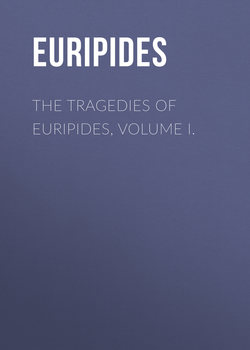Читать книгу The Tragedies of Euripides, Volume I. - Euripides - Страница 42
THE PHŒNICIAN VIRGINS
THE PHŒNICIAN VIRGINS
CHORUS
ОглавлениеI have come, having left the Tyrian wave, the first-fruits of Loxias, from the sea-washed Phœnicia, a slave for the shrine of Apollo, that I might dwell under the snowy brows of Parnassus, having sped my way over the Ionian flood by the oar, the west wind with its blasts riding over the barren plains of waters99 which flow round Sicily, the sweetest murmur in the heavens. Chosen out from my city the fairest present to Apollo, I came to the land of the Cadmeans, the illustrious descendants of Agenor, sent hither to these kindred towers of Laius. And I am made the slave of Apollo in like manner with the golden-framed images. Moreover the water of Castalia awaits me, to lave the virgin pride of my tresses, in the ministry of Apollo. O blazing rock, the flame of fire that seems100 double above the Dionysian heights of Bacchus, and thou vine, who distillest the daily nectar, producing the fruitful cluster from the tender shoot; and ye divine caves of the dragon,101 and ye mountain watch-towers of the Gods, and thou hallowed snowy mountain, would that I were the chorus of the immortal God free from alarms encompassing thee around, by the caves of Apollo in the centre of the earth, having left Dirce. But now impetuous Mars having advanced before the walls lights up against this city, which may the Gods avert, hostile war; for common are the misfortunes of friends, and common is it, if this land defended by its seven turrets should suffer any calamity, to the Phœnician country, alas! alas! common is the affinity,102 common are the descendants of Io bearing horns; of which woes I have a share. But a thick cloud of shields glares around the city, the likeness of gory battle, bearing which destruction from the Furies to the children of Œdipus Mars shall quickly advance. O Pelasgian Argos, I dread thy power, and vengeance from the Gods, for he rushes not his arms to this war unjustly, who seeks to recover his home.
99
By πεδιων ακαρπιστων is to be understood the sea. The construction πεδιων περιρρυτον Σικελιας, that is, ‛α Σικελιαν περιρρει. The same construction is found in Sophocles, Œd. Tyr. l. 885. δικας αφοβητος. L. 969. αφαυστος εγχους. See also Horace, Lib. iv. Od. 4. 43.
Ceu flamma per tædas, vel Eurus
Per Siculas equitavit undas.
100
The fire was on that head of Parnassus which was sacred to Apollo and Diana; to those below it appeared double, being divided to the eye by a pointed rock which rose before it. SCHOL.
101
The Python which Apollo slew.
102
Libya the daughter of Epaphus bore to Neptune Agenor and Belus. Cadmus was the son of Agenor, and Antiope the daughter of Belus.
